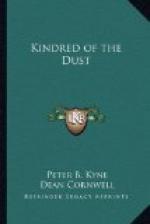His distress was born of the knowledge that between the Sawdust Pile and The Dreamerie there stretched a gulf as wide and deep as the Bight of Tyee. He was bred of that puritanical stock which demands that the mate for a male of its blood must be of original purity, regardless of the attitude of leniency on the part of that male for lapses from virtue in one of his own sex. This creed, Donald had accepted as naturally, as inevitably as he had accepted belief in the communion of saints and the resurrection of the dead. His father’s daughter-in-law, like Caesar’s wife, would have to be above suspicion; while Donald believed Nan Brent to be virtuous, or, at least, an unconscious, unwilling, and unpremeditating sinner, non-virtuous by circumstance instead of by her own deliberate act, he was too hard-headed not to realize that never, by the grace of God, would she be above suspicion. Too well he realized that his parents and his sisters, for whom he entertained all the affection of a good son and brother, would, unhampered by sex-appeal and controlled wholly by tradition, fail utterly to take the same charitable view, even though he was honest enough with himself to realize that perhaps his own belief in the matter was largely the result of the wish being father to the thought.
Curiously enough, he dismissed, quite casually, consideration of the opinions his mother and sisters, their friends and his, the men and women of Port Agnew might entertain on the subject. His apprehensions centered almost entirely upon his father. His affection for his father he had always taken for granted. It was not an emotion to exclaim over. Now that he realized, for the first time, his potential power to hurt his father, to bow that gray head in grief and shame and humiliation, he was vouchsafed a clearer, all-comprehending vision of that father’s love, of his goodness, his manliness, his honor, his gentleness, and his fierce, high pride; to Donald simultaneously came the knowledge of his own exalted love for the old man. He knew him as no other human being knew him or ever would know him; whence he knew old Hector’s code—that a clean man may not mate with an unclean woman without losing caste.
He and Nan had discussed the situation but briefly; for they were young, and the glory of that first perfect hour could not be marred by a minute consideration of, misery in prospect. To-night, they had been content to forget the world and be happy with each other, apparently with the mutual understanding that they occupied an untenable position, one that soon must be evacuated.
Yes; he was the young laird of Tyee, the heir to a principality, and it would be too great a strain on mere human beings to expect his little world to approve of its highest mating with its lowest. Prate as we may of democracy, we must admit, if we are to be honest with ourselves, that this sad old world is a snobocracy. The very fact that man is prone to regard himself as superior to his brother is the




